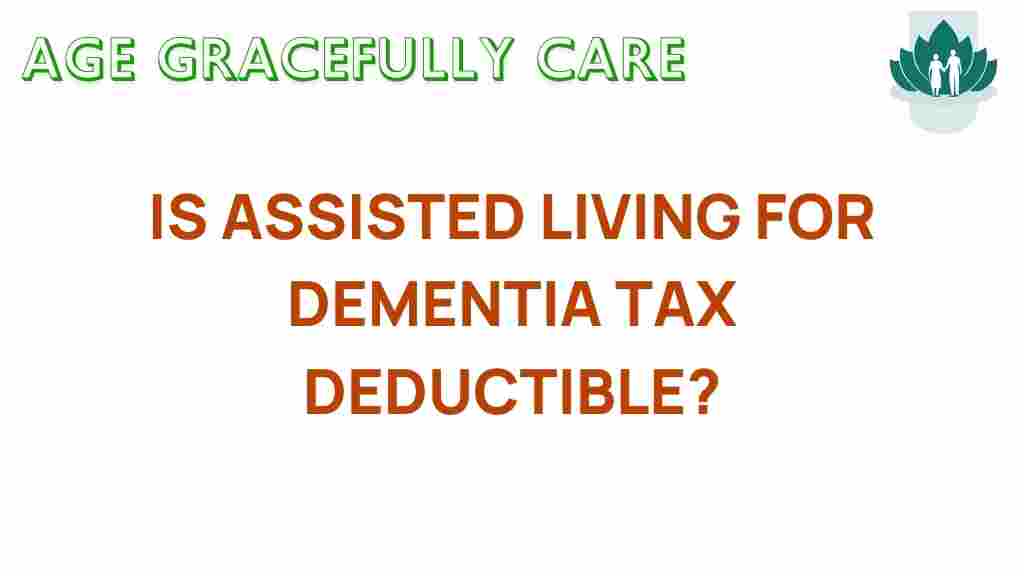Is Assisted Living for Dementia Tax Deductible?
As the population ages, many families are faced with the challenging decision of how to provide care for their loved ones suffering from dementia. Assisted living facilities can offer essential support for those with dementia, providing a safe environment and necessary healthcare. However, one question that frequently arises is whether the costs associated with assisted living for dementia are tax deductible. This article will explore the details surrounding assisted living, dementia, tax deductions, and financial planning, ultimately helping families navigate the complexities of senior care and healthcare costs.
Understanding Assisted Living and Dementia
Before diving into the intricacies of tax deductions, it’s vital to understand what assisted living entails, especially for those dealing with dementia.
- Assisted Living: This type of senior care provides support services such as meals, personal care, medication management, and social activities in a residential setting.
- Dementia: Dementia is a progressive neurological condition that affects memory, cognitive function, and behavior. It often necessitates specialized care and supervision.
Families often choose assisted living as a supportive environment that caters specifically to the needs of seniors with dementia. Such facilities typically offer trained staff and programs tailored to promote cognitive health and social engagement.
Tax Deductions for Assisted Living
The IRS guidelines can be quite complex when it comes to determining what healthcare costs are eligible for tax deductions. Here’s a breakdown of how assisted living for dementia can fit into your financial planning.
Medical Expense Deductions
According to IRS guidelines, certain medical expenses can be deducted if they exceed 7.5% of your adjusted gross income (AGI). This includes payments made for medical care, which can encompass a range of services and facilities. So, can you deduct assisted living costs for someone with dementia?
- Eligible Expenses: The costs for assisted living may be deductible if the facility provides medical care, such as nursing services, physical therapy, or assistance with daily activities.
- Non-Eligible Expenses: Room and board costs are typically not deductible unless the resident is deemed to require significant medical care.
To qualify for a tax deduction, you must be able to clearly outline the medical services received. It is crucial to maintain records of all expenses related to assisted living.
Determining Eligibility for Deductions
To determine if the assisted living expenses qualify for a tax deduction, consider the following:
- Is the individual diagnosed with dementia or another qualifying medical condition?
- Does the assisted living facility provide medical services, or is it primarily a residential setting?
- Are you responsible for paying the costs out of pocket, or are they covered by insurance or government programs?
Consulting a tax professional can be beneficial in navigating these questions and ensuring that you maximize any potential tax benefits.
Financial Planning for Assisted Living
Planning for the financial aspects of senior care can be daunting. Here are some steps to help you manage the costs associated with assisted living and dementia care:
Step 1: Evaluate Your Financial Situation
Take stock of your finances, including income, savings, and any potential insurance benefits that might apply. Understanding your financial landscape will help you make informed decisions.
Step 2: Research Assisted Living Options
Not all assisted living facilities are equal, especially regarding their offerings for dementia care. Research various facilities in your area, focusing on:
- Services provided
- Staff qualifications
- Costs and payment options
- Reputation and reviews
Step 3: Explore Financial Assistance
Look into various financial assistance programs that may be available, such as:
- Medicaid: In some states, Medicaid can help cover the costs of assisted living for eligible individuals with dementia.
- Long-term Care Insurance: If you have a policy, check if it covers assisted living expenses.
- Veterans Benefits: Veterans may be entitled to benefits that help offset costs associated with senior care.
Step 4: Keep Detailed Records
Maintain thorough documentation of all expenses related to assisted living and dementia care. This will not only assist with tax deductions but also help with financial planning and budgeting.
Common Troubleshooting Tips
<pNavigating the process of securing tax deductions for assisted living can present challenges. Here are some troubleshooting tips to help you along the way:
- Consult a Tax Professional: If you’re unsure about your eligibility for deductions, seeking advice from a tax professional can clarify your position.
- Stay Informed: Tax laws and IRS guidelines change frequently. Keep up-to-date with current regulations regarding medical expense deductions.
- Document Everything: In case of an audit or inquiries from the IRS, it is essential to have all necessary documentation readily available.
Conclusion
In conclusion, assisted living for dementia can indeed be a complex topic when it comes to understanding tax deductions and financial planning. While some costs may be deductible under certain circumstances, it is crucial to consider the specific guidelines set forth by the IRS. Families must evaluate their individual situations, explore available resources, and seek professional advice to navigate the financial aspects of senior care.
By taking these steps, families can better prepare for the healthcare costs associated with dementia care and ensure that they are making the most of the potential tax benefits available to them. For further information on financial planning and elderly support, visit this resource.
Additionally, for more information on the complexities of assisted living and dementia care, check this article that provides further insights.
This article is in the category Resources and created by AgeGracefullyCare Team
